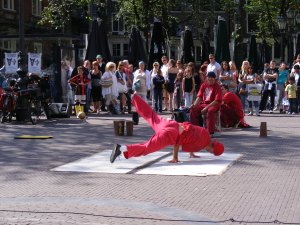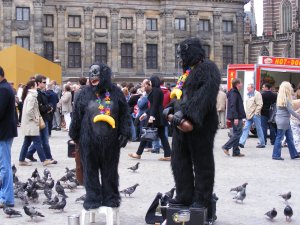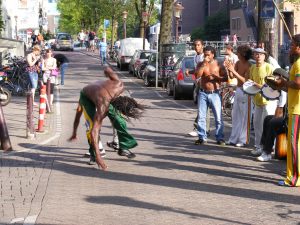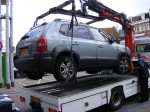Cultural Differences Can Be More Than Amusing. We have been living in the Netherlands for nearly five weeks now and we’ve become accustomed to the essentials: we watch out for speed demon bicyclists – they’re everywhere!; we can easily distinguish between the 1- and 2-Euro coins; and we can read the European train time tables with relative ease and little mishap (no small feat!) However – and you knew that was coming – there are a number of cultural differences that we’ve noted. Some are amusing, some perplexing or frustrating, others – being Dutch – eminently practical — yet most have added to our ultimate enjoyment of living in the Netherlands.
The Practical
Cash, not credit, is king. I was warned to have plenty of cash on hand, as many stores will not accept credit cards, and what a useful tip that was. Like most Americans, I was accustomed to paying for virtually everything by credit card: groceries, gas, haircuts, vet bills, movie tickets.
Not here. Grocery stores won’t take credit, and most other stores won’t either. And where they do, there can be a hefty fee tacked on for using credit. For example, our initial hotel bill would have been 15% higher if we’d charged it. So having cash on hand is essential, and probably better in terms of not over-extending yourself. And, of course, geldermats (ATMs) are ubiquitous.
The public urinal. I’d grown up with seeing public urinals in France, so I was quick to recognize in them in Amsterdam and Utrecht. I also noticed that as in the one pictured below, they are often situated near large bars and cafés. Michael pointed out an oddity, though. He said that when he goes into men’s restrooms in restaurants, there are no urinals, but individual, completely enclosed toilet stalls. So, here’s the dichotomy: open air urinals which leave little to the imagination as to what the guy is doing, and, the completely closed off little pooping-and-pissing cabana.
Go figure!
There had to be something I didn’t like!
No ice, no free water. Water is not served automatically in restaurants, and when requesting water, your choices “with gas” or “without gas” — but “no charge” is not an option. In fact, a small bottle of water can cost as much as a glass of beer. What is also remarkable (to me), is that the bottled water is rarely cold, and even more scarce are ice cubes. The eating and drinking establishments as a whole almost never serve you any drinks – water, sodas, tea, etc. – with ice in them.
And a couple of times when I have received my pricey bottle of water, the
accompanying glass had one, lone ice cube in it. One ice cube.
People who know me well are aware that I drink a lot of ice water. And I mean ice-cold water, as in filled-with-ice-cubes cold water. So, I have to admit, no ice and no free water has been a cultural adjustment for me. Solution? I went out and bought two icecube trays.
The Charming
Hanging out is a national occupation.
Everyone knows that Americans work way too much. We work ridiculous hours, and in some professions the 60 hour+ workweek is de rigeur. Contrast this idiotic workaholic predilection with the Dutch: does anyone work an 8-hour day? From about 11 a.m. until after 9 p.m. cafés and restaurants are packed with people, especially if it’s a nice day out. On a sunny day, outdoor lounge space is at a premium. In fact, I wonder where the restaurants store all their tables and chairs when it’s raining.
Perhaps they have the opposite of a giant dehydration machine: when the sun’s out or the temperature rises above 18°C (65°F), café tables and chairs mushroom out of the sidewalks and plazas as people come flocking. And what’s really nice is the relaxed attitude of the servers: you want to nurse one cup of coffee or one small beer for the next 2 hours – no problem!
And people especially love to hang out by the Oude Gracht (Old Canal) in Utrecht for both drinks and dinner.
Street performances. Nearly all of the street performances we’ve seen have been in Amsterdam, and they have ranged from amazingly good to the truly awful. In fact, one singer and her accompanying keyboardist were so bad that the café patrons didn’t just ignore them, they booed them. Tough audience! Probably the most delightful “street” performance was by a 20-odd person orchestra on a train station in Breda. Totally an unexpected surprise. Betcha you’ve never seen that in the States!
Here’s a few performance “artists” from Amsterdam:
The Three-Kiss Greeting. The traditional Dutch greeting among friends is three pecks on alternating cheeks. No one can explain why or how this customcame about, and why three kisses. But this is the normal greeting among friendsupon arrival and departure.
Only in the Netherlands…
Parking violations are taken way too seriously!
We happened upon a vehicle being towed at the Nieuwe Markt plaza in Amsterdam. Given the narrow streets, Dutch have developed a unique method of hauling away vehiclesvthat are broken down, in accidents, or – as in this case – illegally parked.
And the fines for leaving your car in a no parking zone? According to one of the policemen at this scene, the parking fine is about €70, plus another €400 for the tow fees, and then another €50 per day for each day your impounded vehicle is unclaimed. And, he added, if you try to abandon your vehicle, the city will sell it and keep the money, but you will still owe all the accumulated fines. Citizens will be tracked down to pay up and tourists can’t leave the country until they settle their fines. Good incentive to own a bicycle.
In a city with about 100 kilometers of canals…..
If you think about it, having a DHL delivery boat in Amsterdam makes a whole lot of sense!
And the real whopper: the “Code Blue” bicycle. Yup. We went with medical students for a tour of the ER at the University of Utrecht hospital. The physician giving the tour pointed out a
bicycle with little cart attachments. She explained that whenever a “code blue” (cardiac arrest) occurred in the hospital, one of the ER physicians hops on the bike and “pedal like crazy” to get to the afflicted patient, crash cart and all. I wished we had gotten a photograph.
![]()

Carol Barbier Rolnick grew up in Japan and Southeast Asia, traveling extensively as a child through Asia, the Mideast and Europe on family vacations. Travel has continued as a priority through raising kids and continuing into retirement, extending adventures through the Americas, southern Africa, Asia, and repeat trips throughout Europe. Carol and her husband, Michael spent four summers based in Utrecht, The Netherlands, which has become like a second home. They are (still) aiming towards Australia-New Zealand and Antarctica to round off their continental travels.




















